Comprehensive Guide to Garden Maintenance in Ruislip

Introduction to Garden Maintenance in Ruislip
Maintaining a beautiful garden in Ruislip requires a blend of skill, dedication, and the right techniques. Whether you are a seasoned gardener or a novice, understanding the specific needs of your garden can make all the difference.
Ruislip's climate, soil type, and local flora play crucial roles in determining the best maintenance practices. By tailoring your garden care routine to these factors, you can ensure your plants thrive all year round.
In this article, we'll explore essential tips and strategies for effective garden maintenance in Ruislip, helping you create and sustain a vibrant outdoor space.
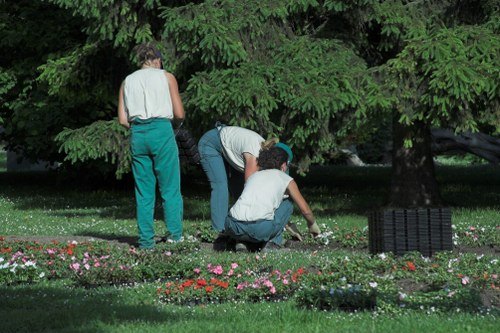
Understanding the Ruislip Climate
Climate Overview
Ruislip experiences a temperate climate with mild winters and warm summers. This climate is conducive to a wide variety of plants, but understanding seasonal changes is key to successful garden maintenance.
Spring brings new growth and the perfect time for planting bulbs and annuals.
Summer requires diligent watering and pest control to keep your garden flourishing.
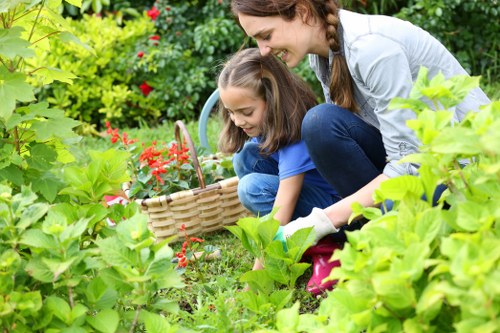
Soil Preparation and Health
Testing Soil Quality
Before starting any gardening project, it's essential to test your soil's pH and nutrient levels. Ruislip's soil tends to be clayey, which can affect drainage and plant health.
Use a soil testing kit or consult with a local garden center to determine the specific needs of your garden.
Amending your soil with compost or organic matter can improve texture and fertility, promoting healthier plant growth.
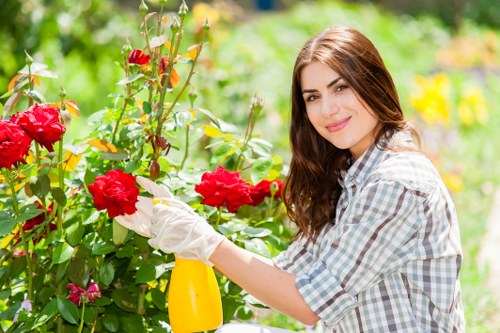
Plant Selection and Care
Choosing the Right Plants
Select plants that are well-suited to Ruislip's climate and soil conditions. Native plants are often the best choice as they are adapted to the local environment and require less maintenance.
Consider a mix of perennials and annuals to ensure your garden has continuous color and interest throughout the seasons.
Proper Planting Techniques
Plant at the right depth and spacing to allow for adequate growth and airflow. Overcrowded plants can lead to disease and hinder development.
Mulching around plants helps retain moisture, suppress weeds, and regulate soil temperature.
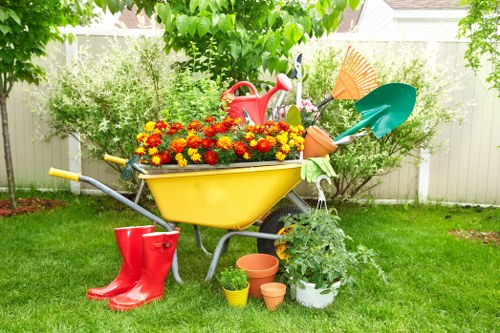
Regular Maintenance Tasks
Pruning and Trimming
Regular pruning helps maintain the shape of your plants, encourages new growth, and removes any diseased or damaged sections.
Use clean, sharp tools to make precise cuts, and follow specific guidelines for each plant species.
Weed Control
Weeds compete with your plants for nutrients and water. Implementing effective weed control measures is crucial for a healthy garden.
- Hand-pulling: Especially effective for smaller gardens.
- Mulching: Prevents weed seeds from germinating.
- Herbicides: Use selectively to avoid harming desirable plants.
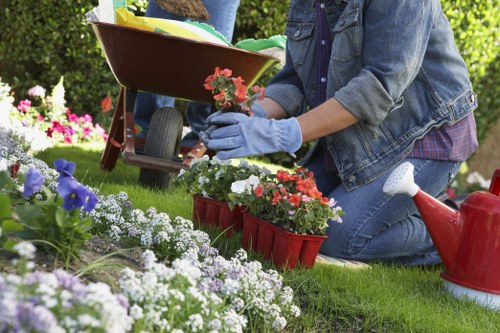
Watering Strategies
Efficient Watering Techniques
Proper watering is essential for plant health. Overwatering can lead to root rot, while underwatering can stress plants.
Implement drip irrigation systems or soaker hoses to deliver water directly to the roots, minimizing evaporation and waste.
Watering Schedules
Adjust your watering schedule based on the season and weather conditions. During hot summer months, your garden may require more frequent watering.
In contrast, during cooler periods, reduce watering to prevent waterlogged soil.
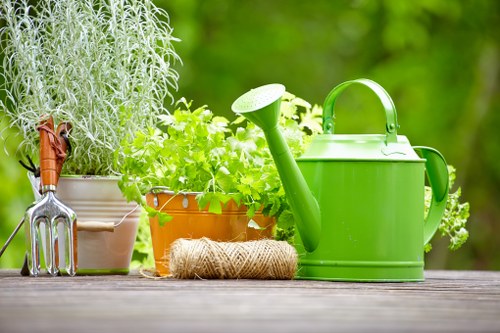
Pest and Disease Management
Identifying Common Pests
Ruislip gardens can attract a variety of pests, including aphids, slugs, and beetles. Early identification is key to controlling infestations.
Regularly inspect your plants for signs of pests, such as chewed leaves or sticky residues.
Organic and Chemical Control Methods
Opt for organic pest control methods whenever possible to maintain an eco-friendly garden. Introduce beneficial insects like ladybugs to naturally reduce pest populations.
If chemical treatments are necessary, choose products that are safe for your specific plants and the environment.
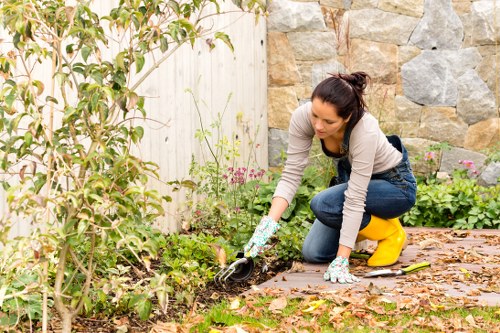
Lawn Care in Ruislip
Maintaining a Healthy Lawn
A well-maintained lawn can enhance the overall appearance of your garden. Regular mowing, aeration, and fertilization are essential practices.
Mow your lawn to the appropriate height based on the grass type, typically around 2.5 to 3 inches for most varieties.
Dealing with Common Lawn Issues
Keep an eye out for common lawn problems such as bare patches, weeds, and fungal diseases.
- Reseeding: Fill in bare spots to promote a lush, even lawn.
- Weed Control: Apply pre-emergent herbicides in the spring to prevent weed growth.
- Fungicide Treatments: Address fungal issues promptly to avoid widespread damage.
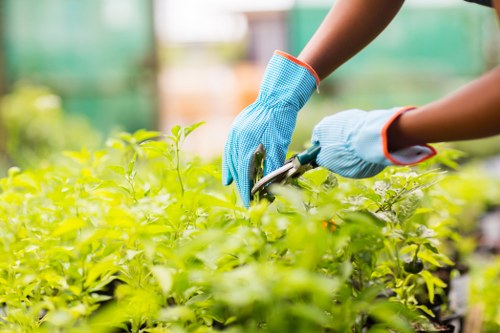
Seasonal Garden Maintenance
Spring Maintenance Tips
Spring is the perfect time to prepare your garden for the growing season. Start by clearing out any debris and pruning overgrown plants.
Planting new flowers and vegetables early in the spring ensures they have a full growing season to establish themselves.
Summer Care Routine
During the summer, focus on consistent watering, mulching, and pest management. Keep an eye on the weather to adjust your care routines accordingly.
Provide shade to plants that may be susceptible to heat stress to prevent wilting and sunburn.
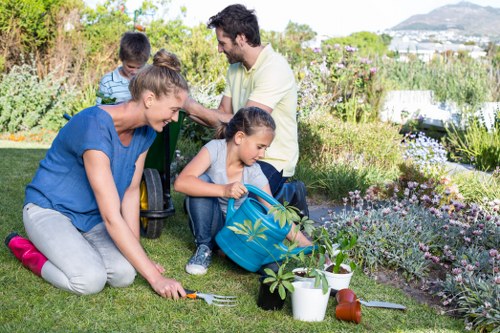
Autumn and Winter Garden Care
Preparing for Autumn
As autumn arrives, it's time to prepare your garden for the colder months. Start by harvesting any remaining produce and removing spent plants.
Applying a layer of compost or mulch can protect plant roots from temperature fluctuations and retain soil moisture.
Winter Maintenance Strategies
Winter is a period of dormancy for many plants, but maintenance is still important. Protect sensitive plants with frost covers and ensure they are well-watered before the first frost.
- Pruning: Remove dead or damaged branches to prevent breakage from snow and ice.
- Tool Care: Clean and store garden tools properly to extend their lifespan.
- Planning: Use the winter months to plan for next year's garden improvements.
Choosing the Right Garden Tools
Essential Tools for Garden Maintenance
Having the right tools makes garden maintenance tasks easier and more efficient. Invest in high-quality tools that are comfortable and durable.
Key tools include:
- Pruners and shears
- Spades and forks
- Garden hoses and watering cans
- Gloves and protective gear
Tool Maintenance Tips
Regularly clean and sharpen your tools to ensure they function effectively. Proper maintenance extends the life of your tools and reduces the risk of plant damage.
Eco-Friendly Garden Practices
Sustainable Gardening Techniques
Adopting eco-friendly practices not only benefits the environment but also enhances the health of your garden. Incorporate sustainable techniques such as composting, rainwater harvesting, and using organic fertilizers.
Composting kitchen scraps and garden waste enriches your soil naturally, reducing the need for chemical fertilizers.
Attracting Beneficial Wildlife
Creating a habitat for beneficial insects and birds can naturally control pests and improve pollination. Planting a variety of flowers and providing water sources encourages a diverse ecosystem.
- Install birdhouses and birdbaths
- Grow nectar-rich plants to attract pollinators
- Use companion planting to deter pests
Professional Garden Maintenance Services
When to Hire Professionals
While DIY garden maintenance can be fulfilling, certain tasks may require professional expertise. Consider hiring garden maintenance services for complex landscaping projects, pest control, or regular upkeep if your schedule is tight.
Professionals can provide tailored solutions that save time and ensure your garden remains in optimal condition.
Choosing the Right Service Provider
Select a reputable garden maintenance company in Ruislip by checking reviews, requesting quotes, and assessing their range of services. A reliable provider will understand the local climate and offer personalized maintenance plans.
DIY Garden Maintenance Tips
Simple Maintenance Hacks
Even if you prefer a hands-on approach, certain hacks can simplify garden maintenance. For instance, using mulch not only suppresses weeds but also retains soil moisture, reducing the frequency of watering.
Installing a drip irrigation system ensures efficient water usage and delivers moisture directly to the plant roots.
Cost-Effective Maintenance Solutions
Maintaining a garden doesn't have to be expensive. Utilize recycled materials for garden beds, create compost from kitchen scraps, and propagate plants from cuttings to save money.
- Reuse old containers as planters
- Make your own natural fertilizers
- Harvest rainwater for irrigation
Common Garden Maintenance Mistakes to Avoid
Overwatering and Underwatering
One of the most common mistakes is improper watering. Both overwatering and underwatering can harm plants. It's essential to understand the specific water needs of each plant species.
Monitor soil moisture regularly and adjust your watering schedule based on weather conditions and plant requirements.
Ignoring Soil Health
Neglecting soil health can lead to poor plant growth and increased susceptibility to diseases. Regularly amend your soil with organic matter and avoid using excessive chemical fertilizers.
Poor Pruning Techniques
Incorrect pruning can damage plants and inhibit growth. Always use sharp, clean tools and follow proper pruning guidelines for each plant type.
- Avoid cutting too much at once
- Make clean, angled cuts to promote healing
- Prune during the appropriate season
Enhancing Garden Aesthetics
Designing Your Garden Layout
A well-designed garden layout enhances both functionality and beauty. Incorporate pathways, borders, and focal points to create an organized and visually appealing space.
Consider the height, color, and texture of plants to achieve a balanced and harmonious design.
Lighting and Decorations
Adding garden lighting not only extends the usability of your garden into the evening but also highlights key features. Solar-powered lights are an eco-friendly option.
Incorporate decorative elements such as sculptures, birdbaths, and benches to personalize your garden space.
- Use string lights for a cozy atmosphere
- Install lanterns along pathways
- Add seasonal decorations to keep the garden vibrant
Gardening Safety Tips
Protecting Yourself and Your Garden
Gardening can be physically demanding, so it's important to prioritize safety. Wear appropriate gloves, sturdy footwear, and protective clothing to prevent injuries.
Be mindful of tool safety and store equipment out of reach of children and pets.
Handling Pesticides and Chemicals
If you use pesticides or fertilizers, follow the manufacturer's instructions carefully. Store chemicals safely and dispose of any unused products responsibly.
- Use protective gear when handling chemicals
- Apply pesticides during calm weather to avoid drift
- Keep chemicals in labeled containers
Conclusion: Achieving a Thriving Garden in Ruislip
Maintaining a garden in Ruislip is a rewarding endeavor that brings beauty and tranquility to your outdoor space. By understanding the local climate, soil conditions, and implementing effective maintenance practices, you can cultivate a thriving garden all year round.
Whether you choose to undertake garden maintenance yourself or enlist the help of professionals, the key is consistency and attentiveness to your garden's needs.
Ready to transform your garden? Contact us today to book your garden maintenance service in Ruislip and enjoy a lush, vibrant garden with minimal effort.

